Berkeleyan
'Today we celebrate.'
Eight previous chancellors had some inaugural points to make - and a big day on which to make them
![]()
12 April 2005
For many years, the inauguration of a new Berkeley chancellor - there have been eight prior to this weekend - occurred in conjunction with the observation of Charter Day, the annual celebration of the founding of the University of California in 1878. The energy invested in Charter Day has waxed and waned over the years - this year's celebration will be the third in a row to limit itself to "charter games," such as tugs-of-war, on Sproul Plaza - but a chancellorian inaugural remains a must-attend event.
The rhetoric on such occasions is almost always high-flown, perhaps in keeping with the standard set by Clark Kerr, Berkeley's first chancellor (and later UC president), whose extensive remarks were at once logical and eloquent. His successors have sometimes bracketed their nobler ruminations with expressions of workaday concern (Ira Heyman marveled at the escalating cost of seismic retrofits), but in every case each new chancellor seemed genuinely concerned with striking the right balance of humility and forward-looking ambition . always couched in terms of obligation to the state, society, and the student body.
- The Editors
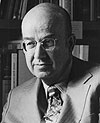 |
March 23, 1953
"The University in a Progressive Society"
For the past three centuries Western thought has been dominated by [the] belief in progress; every aspect of our civilization reflects its impact. It is a belief in the future, not the past; in ideas, not in ecstasy nor in blind fate; in thought, not in faith alone; in the power of ethical imperatives; in the varied will of free men; in the plasticity of history; in a free rein for individual judgment. The evidence of progress in the past three centuries gives plausibility, if not final confirmation, to the wisdom of this belief in progress. We realize today that there are still great unknowns. We know that conscious design can retard progress, as it is retarded in all those countries where scientists and artists must cast their contributions in the narrow mold of state doctrine. We know, also, that conscious design can spur on progress, as it does spur, by wise subsidy, the advance of research in this country today. We now know more about history and the forces that make it than ever before. And while we cannot know for certain that progress will continue, we can at least say that it seems possible in the foreseeable future.
Of course, we must recognize that change, even consciously directed change, is not synonymous with progress, and that progress in a single area is not necessarily a net gain. ... Technological gains must be balanced by progress in the areas of ethics, culture, and democratic government. Moreover the character of the progress should not be determined by the few, but rather by the many. Nor, at the same time, should progress be revolutionary. For means do influence ends, and revolutions, aside from their costs in lives, are costly also in reason. They nurture irrationality and irrationality begets tyranny. Only in balanced, thoughtful, reasoned evolutionary change lies the true prospect of continuing progress.
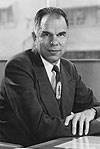 |
March 20, 1959
"Learning in the World of Change"
A condition of our successful adaptation to the World of Change is the cultivation, in university centers, of incisive minds to extend the quarrying of new meanings from nature, the perception of new relationships in human experience, and the capture of new insights into beauty. We have become accustomed to what may seem at first glance large outlays from the federal government for scientific research. Yet when we measure the total funds for such investigations against the potential and the need, we find excellent estimates that support of basic sciences is less than one half what could be invested to our great profit. If basic scientific research is impoverished, consider how poorly supported is the creation of knowledge in the arts, humanities, and the social sciences, whose association with the national welfare, unlike science, has been poorly recognized. There is here an imbalance in the stimulation of knowledge-seeking, which, I believe, we must work to correct.
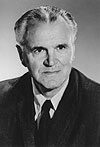 |
March 23, 1962
"Responsible Freedom"
An institution dedicated to inquiry will create a tension between itself and the larger community by the new ideas it advances and by its critical examination of ideas inherited. Ideas live in their dissemination from mind to mind; ideas die when this vital transmission ceases. Where the thinking proceeds freely and fairly in the discussion of ideas, and where the ideas embodied in doctrine or theory are kept subject to tests of evidence and rules of reason, action guided by thought becomes rational and men lead lives that can deservedly be called lives of reason. The creative and critical process of inquiry is the very life of a university. This process cannot be curbed, cramped, or confined without destruction of the university's integrity and corruption of its intellectual worth.
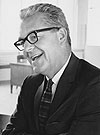 |
March 25, 1966
[O]ur first concern is to encourage in each of our students the development of his own objectives, chosen wisely, and a set of ethical standards that are truly his own - and further, intellectual toughness, the habits and qualities of curiosity, flexibility, objectivity, imagination, resourcefulness, independence, and a sense of responsibility.
We all understand how terribly difficult it is to develop these attitudes, habits, and skills and how imperfectly it is done. It is time-consuming, costly, and requires the best effort of our greatest talent. For we know that if our students are to realize these goals, there must be in the daily life of each of them personal contact with a model - with one who, in his own life ... exemplifies these traits. We don't fully understand the process by which the model molds and shapes the aspirations of his students. But we know it happens.
This potential influence of the academic man on his students places on him a serious burden. But...we have come with relief to discover that these characteristics do develop in our students even though the models are not perfect. We also know, however (and to our sorrow), that imperfections in the teacher interfere with learning, that dogmatic or hypercritical teachers generate their own kind. So it is important that the models be the best we can provide.
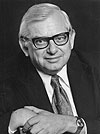 |
April 6, 1972
Twenty years have passed since Clark Kerr became Berkeley's first chancellor. In reflecting on those twenty years, it is easy to become preoccupied with crises, to recall mostly images of the campus beset and beleaguered. Yet ...in those same 20 years the campus increased from 16,000 to 28.000 in enrollment and awarded 120,000 degrees. Many of the university's former students have taken their places in the forefront of the academic, political, social, artistic, and economic life of California. Their leadership is one measure of Berkeley's contribution to our state.
During the past two decades the faculty grew from 900 to 1,700. At the same time it increased in quality, in scholarly achievement, and in distinction, so that today Berkeley is considered the best of the great university graduate schools..
Issues which divided the campus have been resolved or have been greatly diminished. Profound issues persist in the larger society and their tensions are felt on campus as elsewhere. Nonetheless, society has proved itself responsive to many of the criticisms advanced by students and other young people. The nation takes their aspirations for a better society seriously, and has extended them the franchise. Student concerns are still salient, their pursuit of them more persistent and more creative than before.
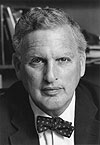 |
April 9, 1981
As we all know, the ethnic composition of California is changing considerably. This fact poses a special responsibility for the educational system. It is to assist members of all groups, especially minorities presently underrepresented at the university, to share the benefits of its programs and thus to become self-sufficient in the pursuit of vocations and independent in the self-fulfilling sense of that word.
...Berkeley is committed to a major role in this effort, which must be effective if California is to obtain the educated men and women it will need for its growth in the decades ahead. As the preeminent public university in California, it has great responsibilities in this regard. We have learned that the process cannot suddenly start in the freshman year at Berkeley. It must start far earlier, and from this realization came the Bay Area Writing Project, whose success has won it national recognition and replication. This is being followed by a similar effort in mathematics reaching out into junior and senior high schools.
This is not a role which the university has played for many decades. Indeed it appears far removed from the highly theoretical orientation of Berkeley as we have known it for the last 25 years. Yet to look back into our history is to find the university doing much the same in the earlier decades of this century. Then the university set the standards for California's high schools and assisted them in developing the teaching necessary to greet them.
That period passed and the systems grew apart, pursuing independent courses, and articulation diminished. Now we confront another turn, but it is not unlike the road traveled before, and while debated now as it was decades ago, the task must be done. That will be a key element in Berkeley's future.
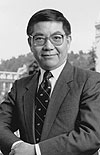 |
March 22, 1991
Berkeley leads the nation among top-ranked universities in ethnic, cultural, and economic diversity at the undergraduate level. Also, the campus is making steady progress in diversity at the graduate level and in the composition of the faculty (where we add gender diversity to the goals). Already, Berkeley is the nation's leading producer of Ph.D. degree graduates among both women and ethnic minorities (as well as being the leading producer of Ph.D. graduates overall).
...Today, the populations of our nation and our state continue to change rapidly, and it is altogether essential that we educate a diverse leadership to serve the needs in every field. This is an imperative for all of higher education. You have my pledge of strengthening and extending diversity at all parts of the campus, while at the same time maintaining always the highest standards of quality and the most steadfast principles of fairness. I am committed to "excellence through diversity." Diversity must be made the means, not the menace of excellence.
 |
April 24, 1998
"On the Threshold of the 21st Century"
[To] those who argue that students should learn only what is practical and useful, we will respond emphatically that nothing is more practical and useful than a refined and educated mind. Nothing is more practical than critical thinking, nothing more useful than a mind that can grasp the genuine complexity of difficult human problems and avoid the lure of simplistic explanations. Nothing is more useful than understanding the moral dilemmas that confront the human condition. And nothing is more needed by our country than citizens who understand the fundamental ecology of a just society - that you have to give back as much as you take from it. The education we provide our students must therefore aim at their full education, at the development of their civic sensibilities as well as their technical expertise or professional skills.

